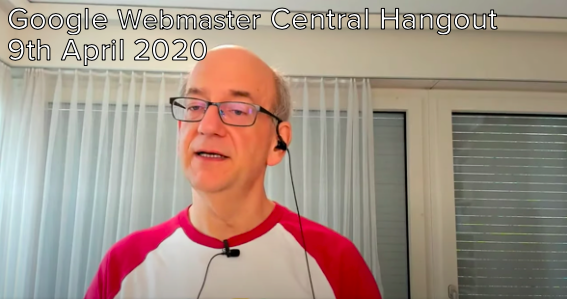Notes from the Google Webmaster Hangout on the 9th of April 2020.
Googlebot May Crawl URLs Found From Submitted Forms
Google may try to submit forms to see what happens, and then crawl any new URLs it finds resulting in an increase in crawl activity.











AMP Pages Have to be on the Same Domain
You can use parameters, subdirectories or subdomains for AMP URLs. The only criteria which is critical for AMP pages is that they must be on the same domain as the alternate, otherwise, the URL format doesn’t matter. You should avoid changing the URL patterns and keep them as long as possible, as changing them requires a lot of reprocessing.










Duplicate Product Descriptions Won’t be Seen as Spam or Low Quality
If you canonicalise product pages with duplicate descriptions, then Google focuses on the canonical page and ignore the duplication. If you don’t canonicalise the pages with duplicate descriptions, then Google just sees those pages as having some similar content and doesn’t consider the pages low quality or spam.









Google Recommends Avoiding Internal Links to Redirects
Google recommends avoiding internal links to redirecting URLs to improve the page speed for users, and because it may impact which URL Google shows in search results. Long Redirect chains can take longer to process.








The Link Title Attribute Isn’t Important for Google
Google picks up information about a link from the anchor text and the context of the link, so the title attribute isn’t necessary for SEO, but may be good for accessibility.







Last Modified Dates in Sitemaps Helps Google to Prioritise Crawling
Google recommends using last modified dates in Sitemaps to help them prioritise which URLs to crawl. It’s OK to implement the last modified dates and other metadata for some URLs not all of them.






Search Console Doesn’t Show Links Dropped by Google
If you have links which have been dropped by Google, such as links to a page that returns a 404, they won’t show up in Search Console. It may take some time for links to pages which have recently become 404 to be removed.





Search Console Aggregate Reports are Based on a Sample of URLs
Some aggregate reports in Search Console (AMP, structured data, mobile-friendly, and page speed) are based on a sample of pages. The index coverage reports are comprehensive and can be used as a way to identify general problems.




AMP API Isn’t Necessary for Google to Cache AMP Pages
Google will automatically cache AMP pages if they can. The AMP API is only necessary if you have a site with a large number of URLs in the AMP cache you need to be refreshed.



Reducing the Number of Pages on Large Sites Can Help
Reducing the number of pages on a very large site can help Google to figure out which pages are the most important, but probably won’t have any impact for a small site.


Search Console Coverage Reports Don’t Include 3rd Party Hosted Sitemaps
If you host your Sitemaps on a 3rd party domain, they can still be used but won’t appear in the Search Console coverage reports.

Be the First to Know About the Latest Insights From Google






